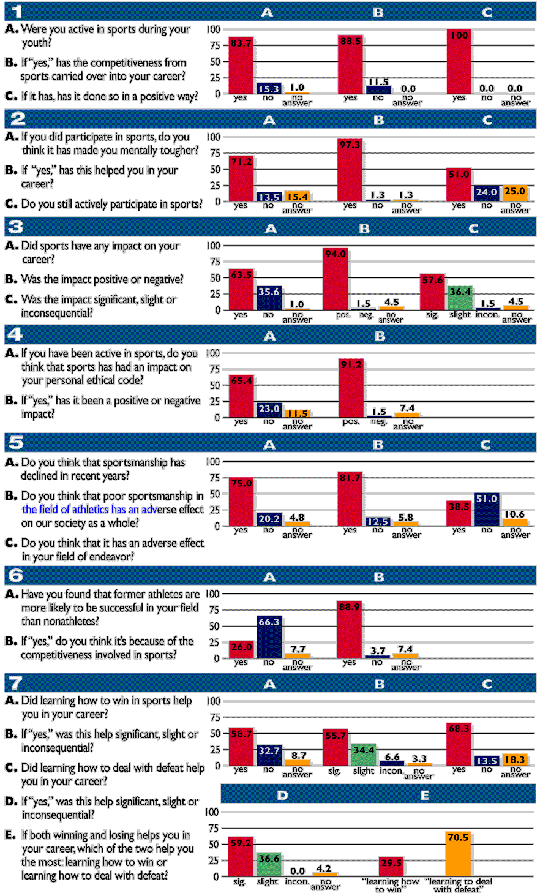
National Collegiate Athletic Association |
The NCAA News DigestMay 10, 1999
Sports influence on careers
A survey conducted by the Institute for International Sports shows that participation in sports has had a positive impact on the careers of many prominent Americans. The survey, which was sent to randomly selected high-level professionals in a variety of fields -- including government, academia, law, medicine, entertainment and business -- revealed that 88.5 percent of the respondents who have been active in sports believe that the competitiveness they learned in athletics has carried over into their careers. Of the respondents, 71 percent thought sports participation had made them mentally tougher. "Sports, both competitive and noncompetitive, teach discipline, focus and the need to be able to think fast to meet changing conditions," said New Jersey Gov. Christine Todd Whitman. "Breaking through the barrier of pain or exhaustion may be unique to sports but carries over to the challenges of everyday life." The poll, which included governors, college presidents and chief executive officers of Fortune 500 companies, showed that 63.5 percent of the respondents felt that their participation in sports has had a definite impact on their career. Ninety-four percent of this group indicated that the impact was positive. The survey also showed that 70 percent of the respondents believe that "learning to deal with defeat" has helped them more in their careers than "learning how to win." "As a university president and former professor of engineering, I have often said that I learned how to be a president on the wrestling mat," said Peter Likins, president of the University of Arizona College of Medicine. For more information, contact David Brennan at the Institute for International Sport (401/874-2375). The Institute for International Sport is based at the University of Rhode Island.
DIVISION IIPresidents Council supports pilot program to boost diversity The Division II Presidents Council has agreed to provide funding of $250,000 in 1999-00 for a three-year pilot program of the NCAA Division II Strategic Alliance Matching Grant Enhancement. The program is designed to increase minority hiring in Division II athletics administration through a cooperative venture between the NCAA and Division II institutions. The program will be implemented either in the 1999-00 or 2000-01 academic year. The Division II Presidents Council endorsed the three-year program during its April 20 meeting in Washington, D.C. Staff contact: Mike L. Racy.
DIVISION IIICEOs endorse expansion of championship brackets The Division III Presidents Council endorsed championships expansion for the division during its April 20 meeting in Washington, D.C. The Presidents Council reviewed and en-dorsed numerous recommendations that had originated with the Division III Championships Committee, including an increase in championships brackets in selected team sports to reflect a 1:7.5 ratio. Previously, the ratio was 1:8. The team sports that would be affected by the recommended increases, effective with the 1999-00 NCAA Division III championships, are: baseball, from 40 teams to 42; women's basketball, from 48 to 50; field hockey, from 16 to 18; football, from 24 to 28; men's lacrosse, from 12 to 14; women's lacrosse, from 12 to 16; men's soccer, from 40 to 44; women's soccer, from 40 to 45; and softball, from 40 to 43. Field sizes in selected individual sports also would increase. Staff contact: Daniel T. Dutcher.
EXECUTIVE COMMITTEEGuidelines approved for restricted-earnings payment The NCAA Executive Committee has established guidelines for how and when Division I conferences will remit the balance due for the restricted-earnings coaches settlement. The payment plan was developed by the Division I Management Council members of the Budget Subcommittee and ultimately approved by the Division I Board of Directors. Staff contact: James L. Isch.
|
